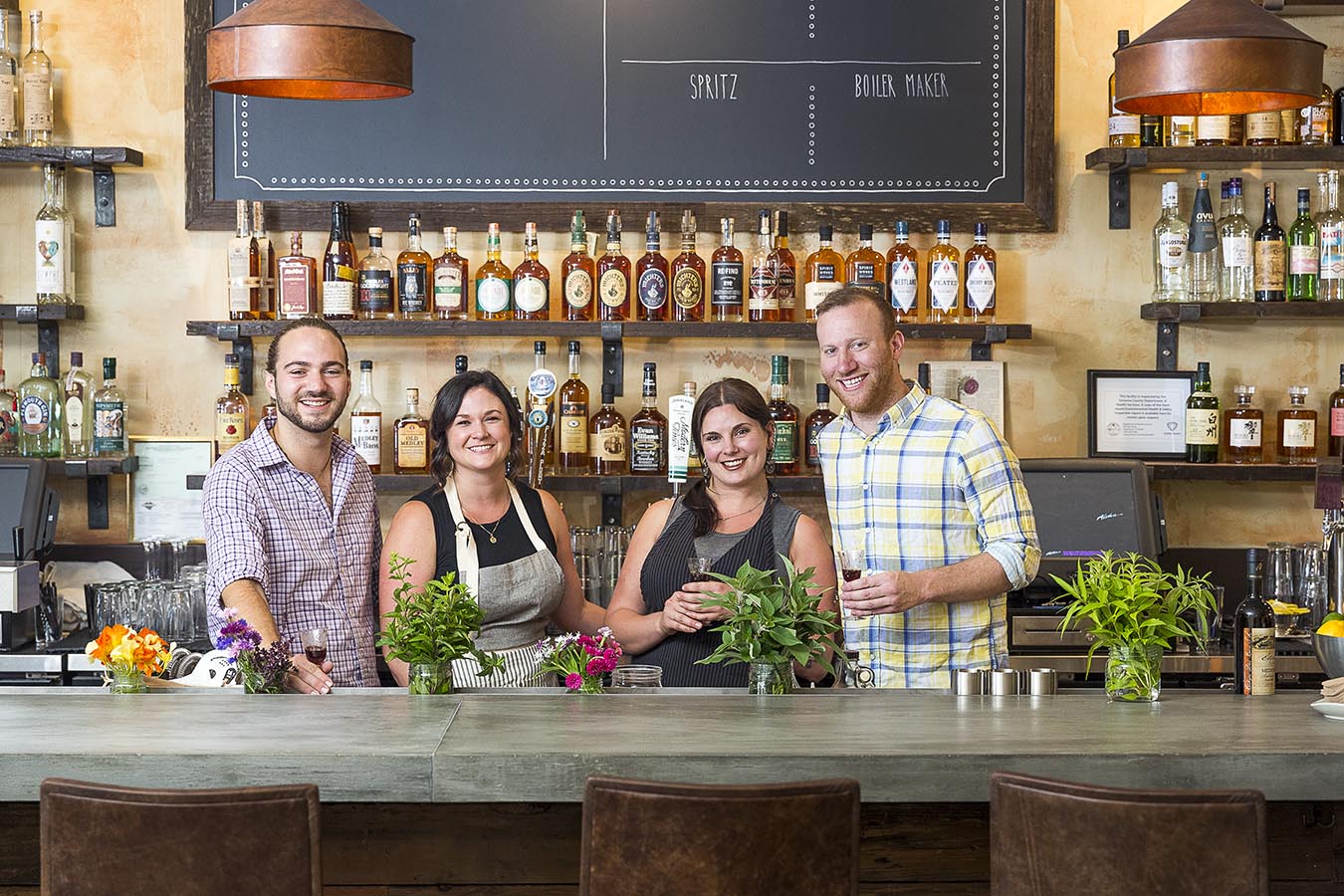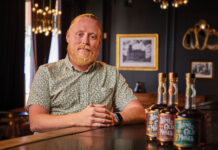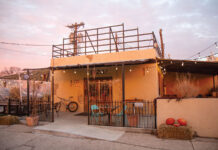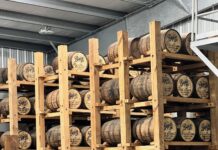
In 2016, a very special bar opened in downtown Healdsburg from three Spoonbar (https://spoonbar.com) alums: Laura Sanfilippo, Tara Heffernon and Steven Maduro. Since its initial days when Wine Country bartending pioneer Scott Beattie first helmed Spoonbar’s bar, cocktails in a region (still) known first for wine were elevated to city-worthy levels. When this dynamic three opened Duke’s Spirited Cocktail Bar, it immediately became a cocktail destination and the rare Wine Country bar to compete with the world-class bars of San Francisco — and thus the best bars anywhere.
Thoughtful, layered cocktails made with balance and expertise define the menu — as does local produce and local spirits — while crushable, easy drinking remains crucial for the mix of tourists, day-trippers and locals that stream through. But it’s their exceptional, familial hospitality that makes Duke’s feel like a laid-back party where all are welcome. By day, sun streams through a skylight and big front windows overlooking Healdsburg’s town square. By night, dance parties occur toward the back, alongside communal conversation and connecting at the bar.
Laura’s experience ranges from being a Certified Sommelier to her consulting company, Batch Cocktails (co-founded with Tara), where they designed wine country bar programs and did product and recipe development for spirits brands. Tara has been working in Sonoma County restaurants since she was 14, co-founding Batch Cocktails with Laura. Steven moved to California from northern Virginia in 2011 and began bartending at Healdsburg Bar & Grill, then eventually Spoonbar, where he met and worked with Tara, Laura and Cappy.
Enter Cappy Sorentino. A Sonoma native, who also was a Spoonbar alum and the first to take over that bar from mentor Scott Beattie in 2011–2014, he returned to his home county after a few years leading bars at notable restaurants in Los Angeles. He joined the management team at Duke’s, completing the powerhouse foursome. They went on to plot the opening of their second, more upscale bar, Burdock, which at the time of writing was slated to open this summer.
Here, all four share a bit about their past, their present, the future, operating bars in a pandemic and what needs to be different about ABC laws.
What led you into the cocktail and the bar world?
Laura: I got into the bar and cocktail world 100% because of my parents. My dad was in hospitality all my life and worked as a maitre d’ in hotel restaurants. He was old-school hospitality and taught me everything about service and entertaining guests. My mom is an amazing cook and our dinners growing up were always different. She loved to cook cuisine from all over the world. We would have cocktail hour before dinner, and my mom would always come up with some fun cocktail to pair with what we were eating (this was in the mid ‘90s!) I remember she made Cable Cars one night but made her own kumquat simple syrup to use in the drink. I would get non-alcoholic versions, of course. Margaritas were my mom’s favorite drink. She would always make us juice the limes fresh for the margaritas (again in the 90s). My first bartending gig was at my house for a party my mom was throwing for one of her employees. I was begging to bartend since I had always wanted to do that from an early age. I was 15 and shook drinks all night for the guests and had the time of my life. I was hooked.
From then, I worked in all aspects of the industry from dishwasher to breakfast cook at a cafe, to host, server and ultimately bartender. Tara, Cappy and Steven all have similar stories of beginning in this industry at an early age. We are all industry “lifers” and share a deep commitment to hospitality and making guests leave happier than when they came in.
Cappy: I knew at a very young age I was going to be in hospitality. From my junior year of high school, I knew I wanted to be in restaurants and to be a host. I began cooking, baking and bringing food to classmates and began planning and hosting parties. I began work at local restaurants, picking up everything I could, all with the end goal of having my own establishment one day. I pored over food and drink books, from Setting the Table, Imbibe, to Cosmopolitan: A Bartender’s Life. I gradually began working my way up the restaurant and bar ladder to the holy position of “keeper of booze.” [In] no other position in the industry do you have both hospitality, hosting and creativity in creating an actual thing for a guest.
How does being based in Sonoma County influence your bar’s style and operations?
Tara: Sonoma County is a mecca of food and drink innovation, with year-round bounty right outside our doorstep. There is constant inspiration from local chefs, growers, winemakers and the rising farm-to-bar movement that I am so proud to be a part of in this community.
Being based in Sonoma County allows us to be seasonal and self-sustaining in a way that most bars around the world cannot. I have a small farm at my home in Forestville where I have spent the last ten years growing herbs, produce and edible flowers specifically for cocktails. This last year my partners agreed to invest in a new greenhouse that my husband built on our property, which has allowed my seed production to skyrocket, guaranteeing year-round production of things that were previously seasonal. In the winter, our cocktails are covered in savory items, carrot fronds, baby chards and beet greens. In the summer, the bartop looks like a nursery of pineapple sage, a variety of mints and basils, thyme, rosemary, cilantro, fennel, bay and edible flowers. We make syrups, shrubs, cordials and bitters in addition to the garnish game using stone fruit, berries, quince, gooseberries, apples, currants, elderberries, peppers, tomatoes, cucumbers, beets and more.
It’s not lost on me how lucky we are to be able to cultivate our own ingredients, then have the fun of turning them into unexpected combinations. It’s what makes living here so special.
What is your philosophy on deciding what brands to stock and to invest in?
Tara: Quality of flavor, appropriate price point and sustainable production. Taste is obviously the first factor. Even our wells [well bottles] are spirits that we enjoy drinking straight. Redefining the term well is important to our program. Balanced, well-made spirits make for well-made cocktails and happy sipping.
Price point must play a role, as we always want to keep the experience approachable for our guests. Spirits do not need to be over-the top-expensive to be delicious. While we have a selection of boutique spirits that are worthy of high price points, we also feel it is important to have the price match what’s inside the bottle.
We also consider ourselves a green property, and this extends to our spirit selection. We strive to support smaller and more sustainable producers in our 500-plus bottle selection. Despite the fact that we are obsessed with booze from all over the world, we are also blessed by having so many amazing local distilleries that we still consider ourselves comparative localists.
How do you educate customers on small-batch, quality spirits?
Laura: In order to educate our guests, we have to be educated ourselves. We are constantly reading, learning and visiting distilleries to make sure we understand completely how the product is made and what specifically the producers do that contributes to the flavor and outcome of the spirit.
Another aspect of educating guests is to dispel the long-held myths and misinformation surrounding spirits. People still think that bourbon can only be made in Bourbon County and we have a duty to show them all the delicious small-batch bourbons and other whiskeys made all over the country. Breaking through the blind brand name attachments people have to spirits is another way we educate. We see this the most with vodka and tequila. For example, we carry a lot of beautiful craft vodkas but people are hesitant when we don’t have the big name brands they are looking for. Knowing how the vodka is made, what it’s made from and how that will translate into finding something similar to what they are looking for, we are able to confidently recommend an alternative that will make them happy.
Most importantly, when we are educating people about small-batch spirits, we do so in a kind and genuine way. It’s important not to ever make people feel stupid or lecture them, otherwise thay may never feel comfortable asking a question to a bartender and miss the opportunity to be turned on to something new.
How are you surviving pandemic and what new forms of business have you implemented?
Laura: It has been a struggle for sure but we have managed to survive thanks to a multitude of things. We are lucky enough to have a kitchen on property, so we were able to sell food and cocktails to go right away after the shutdown. We implemented online ordering, while also taking phone and walk-up orders. Our location on the main plaza in Healdsburg and our accordion doors that open onto the street with a fold-down bar area allowed us a safe and easy pick-up area for online and walk-up, to-go orders.
We created cocktail kits that we sold so people can pick up everything they need to make our cocktails at home, including ice. To go along with the kits, Cappy made YouTube videos of him making the drinks at home so people could follow along and make the cocktails. We began doing weekly Virtual Tastings with local distilleries where we would make up tasting kits that people would pick up ahead of time and then we would all taste together with the distiller via Zoom. After the tastings, we would sell the bottles at retail pricing. Those proved very successful and were a great way to sell existing inventory.
But our most successful thing we’ve done is our canned cocktails. We began canning cocktails using a canner borrowed from our friends at Alley 6 Distillery. Cappy and Steven worked very hard to dial it all in so that we could can classics like an Old Fashioned and a Negroni but also our most popular carbonated tap cocktail the Fool’s Paradise. We can’t keep the cans on the shelf and are hoping to pivot that into a commercial business on the side.
How do you envision the bar world evolving in the coming years?
Steven: I think it will keep evolving in the direction it already has been heading the last 10–20 years: more of a focus on quality, sustainability in products but also creating a quality of life and sustainability for employees as well. I believe that the current climate of the world and some of the issues it has brought to light will be addressed.
I see the bar world all over moving more to what you are starting to see in big cities. Higher prices for drinks and food, but doing away with gratuities, therefore higher hourly rates for employees. Service charges to be used to provide employees with insurance and benefits. I think this pandemic has exposed how fragile this industry is and the style of work that we do, but still how necessary we are to the general public. I can’t tell you how many times I’ve seen people come into work when they shouldn’t because they can’t afford to miss their $200 shift to only make $50 in sick pay.
Those times have to stop. We deserve to take time off for a couple weeks’ vacation with our families, we deserve to get to stay home when we’re sick or injured and we deserve to have a retirement to look forward to. There was a time when being a bartender was a respected position in a community. I see that coming back more everyday and I believe we are moving toward having the same allowances and benefits that most other industries in this country are provided.
What do you see as your biggest needs going forward?
Steven: The biggest need I believe will help our industry is the loosening of the archaic ABC laws that we all are still having to abide by. I believe in the same way that regulations are loosening for marijuana — i.e., letting adults be adults and trusting them to do that — they need to be loosened for us as well.
So far, the small sample we’ve seen from to-go cocktails has been unbelievably effective, profitable and, in some cases, it’s keeping businesses afloat right now. I still have not heard of any issues arising from that. Shocker that the 80-year-old laws against it aren’t relevant or correct any longer. It has been great to see local municipalities opening up consumption in more public gathering places. So far once again it has been effective and generated more sales.
I believe that ABC passing regulations allowing for local governments to have the ability to permanently create open public areas that they deem are appropriate for drinking and responsible safe gathering will help all small businesses. When I can sell a daiquiri to someone in 100 degree heat, they’ll finish that and then their next stop is a local shop with A/C. Who isn’t guilty of buying more things than planned once you have a little liquid courage?
Ultimately, the point of this is to keep people involved and present in their communities rather than going home and running up a long Amazon shopping list; they get plenty of our money already. It’s 2020 and restaurant and bar workers make up 10–15% of the working population. How do we not have a seat at the table or any voice in making, passing or providing insight into lawmaking of the alcohol industry? It’s time to revisit these outdated laws and start thinking toward the future and how we can adapt to the times. These are scary times, but we can get through them if we listen and grow.








